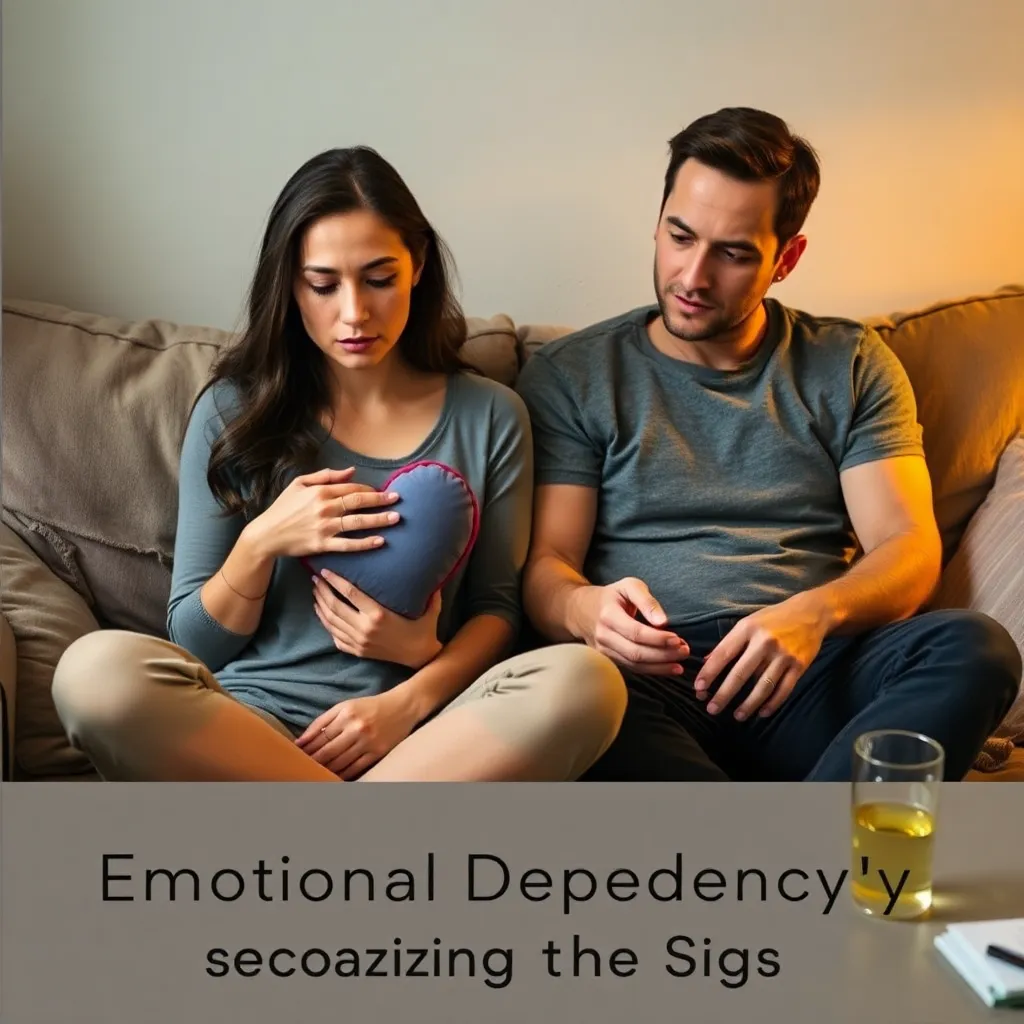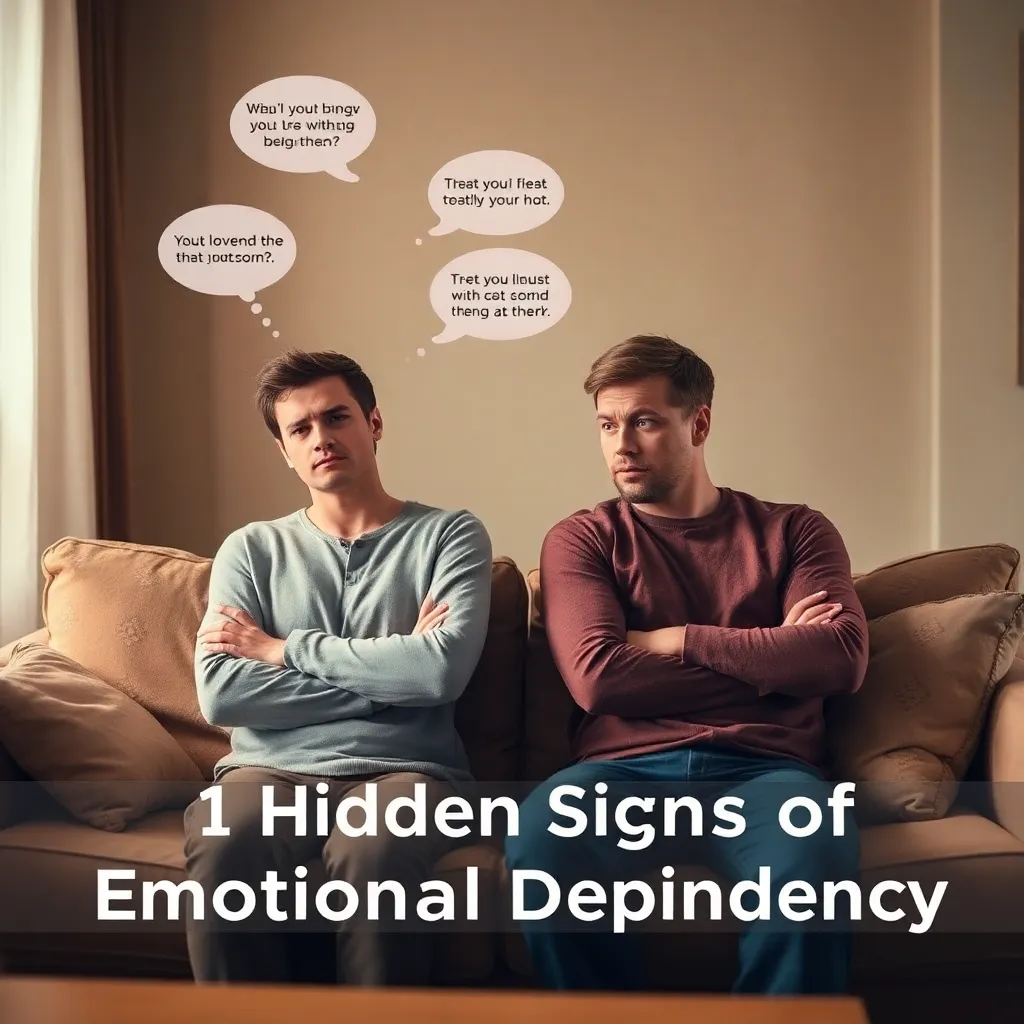Navigating the complexities of relationships can often feel like walking a tightrope, where balance is crucial yet sometimes elusive. Emotional dependence can subtly weave its way into our connections, leaving us feeling vulnerable and unsure of our own autonomy. This article will gently guide you through recognizing the often-overlooked signs of emotional dependency, helping you understand the subtle cues that might be impacting your personal growth and relationship satisfaction.
It’s important to recognize that emotional dependency doesn’t mean there’s something wrong with you or your relationship; rather, it reflects how deeply interconnected our emotional worlds can become. By identifying these hidden signs, you equip yourself with the knowledge to foster healthier, more fulfilling connections. Through this exploration, you’ll gain insights into how your emotional patterns can shape your relationships and discover ways to nurture your individuality within them.
As you read on, you’ll uncover practical strategies to regain emotional independence and enhance the quality of your relationships. Our aim is to provide you with tools that are both realistic and transformative, empowering you to take steps towards a more balanced emotional life. With empathy and understanding, let’s embark on this journey together to explore the dynamics of emotional dependency and learn how to cultivate empowering relationships.
1. Constant Need for Reassurance

A constant need for reassurance can often signal emotional dependency in a relationship. This is when one partner frequently seeks validation from the other, feeling insecure without continual affirmations of love and commitment.
Imagine a scenario where someone texts their partner multiple times a day, asking if everything is okay. This behavior can strain the relationship, as it places an emotional burden on the partner to constantly provide reassurance.
Experts suggest that this need often stems from past experiences of rejection or abandonment. By understanding these roots, individuals can begin to work on nurturing their self-confidence and reducing dependency.
One way to manage this need is by practicing self-affirmation and building self-esteem independently. This empowers individuals to feel more secure within themselves, reducing the pressure on their partner to constantly validate their worth.
Ultimately, fostering self-love and trust in your relationship can lead to a healthier, more balanced partnership. By addressing emotional dependency, partners can enjoy a more secure and fulfilling connection.
2. Fear of Being Alone

Transitioning from the need for reassurance, a deep-seated fear of being alone can subtly bind you to emotional dependency. This fear often stems from past experiences or societal pressures, making the thought of solitude seem daunting or even unbearable.
Consider relationships where one partner clings tightly, fearing the void that might follow a breakup. In such scenarios, the relationship becomes more about avoiding loneliness than fostering genuine connection and growth.
Renowned psychologist Dr. Susan Johnson suggests that people often confuse solitude with loneliness, missing out on the personal growth solitude can offer. Embracing time alone allows individuals to nurture self-awareness and build resilience, key components of healthy relationships.
Ultimately, conquering the fear of being alone can lead to stronger, more fulfilling relationships. As you learn to value your independence, you contribute more positively to your partnership, enhancing emotional balance and mutual respect.
3. Overanalyzing Partner’s Actions

When you find yourself constantly overanalyzing your partner’s actions, it’s often a sign of emotional dependency. You may spend hours dissecting a simple text message, attempting to uncover hidden meanings that may not even exist.
Such behavior often stems from a lack of self-confidence and a fear of misinterpretation. For instance, if your partner forgets to call, you might interpret this as a sign of dwindling affection rather than a moment of forgetfulness.
Experts suggest that this tendency can strain relationships, as it can lead to unnecessary arguments and misunderstandings. Instead of jumping to conclusions, focus on open communication to clarify any doubts or worries you have.
In real-world scenarios, couples who engage in constructive conversations are less likely to misinterpret each other’s actions. Make it a habit to ask directly rather than assuming, fostering a more honest and understanding relationship.
The ability to interpret your partner’s actions accurately can create a more trusting environment for both of you. By addressing your insecurities and fostering open dialogue, you’re more likely to enjoy a healthier, more balanced relationship.
4. Sacrificing Personal Goals

Often, we find ourselves putting our *personal goals* on hold for the sake of a relationship. This might look like turning down a dream job opportunity or skipping a cherished hobby because it doesn’t align with your partner’s schedule.
In real-world scenarios, like choosing not to pursue further education to remain close to a partner, the *sacrifice* might seem noble. However, over time, these decisions can lead to *resentment* and a sense of lost identity.
Experts agree that maintaining *individual goals* is crucial for a healthy relationship. Dr. Emily Tanner, a renowned relationship psychologist, emphasizes that partners should support each other’s aspirations to cultivate *mutual growth*.
Ultimately, balancing personal ambitions with relationship needs can lead to a more fulfilling partnership. By setting *boundaries* and openly communicating, you can prevent emotional dependency and nurture a healthier connection.
5. Avoiding Conflict at All Costs

Avoiding conflict at all costs can be a subtle sign of emotional dependency. When you find yourself constantly stepping back to maintain peace, it might indicate an over-reliance on your partner’s approval. Picture a scenario where a couple always agrees on everything just to avoid arguments. Although this seems harmonious on the surface, it can lead to suppressed emotions and unmet needs.
It’s essential to recognize that occasional disagreements are a natural part of any healthy relationship. By consistently avoiding conflict, you may unknowingly prioritize your partner’s comfort over your own emotional well-being. Consider a partner who never expresses their dissatisfaction with shared decisions, fearing it might lead to discord. This approach can often result in personal resentment and unaddressed issues that fester over time.
Experts suggest that learning to handle disagreements constructively can actually strengthen your relationship. Engaging in open and honest dialogues ensures both partners feel heard and valued. For instance, setting aside time each week to discuss any concerns can help prevent small issues from escalating. This practice fosters mutual understanding and respect, paving the way for a more balanced partnership.
Remember, it’s not about avoiding conflict entirely, but about handling it in a way that promotes growth and connection. Embracing this mindset can transform disagreements into opportunities for deeper understanding. Ultimately, recognizing and addressing these hidden signs will help you cultivate a healthier, more fulfilling relationship.
6. Seeking Validation Frequently

In many relationships, the need for constant validation can reveal an underlying emotional dependency. When you find yourself frequently seeking approval from your partner for decisions big and small, it might be an indicator of needing external reassurance to feel confident.
Imagine a scenario where you repeatedly ask your partner if they think you’ve done well at work or if they like your outfit. This behavior can stem from a lack of self-assurance, causing you to rely on someone else to feel valuable.
Experts suggest that while seeking validation is natural, over-reliance can lead to losing touch with your own inner voice. Building self-confidence involves recognizing your worth independently, which can strengthen your relationship by reducing unnecessary pressure on your partner.
To foster healthier habits, try setting personal goals and celebrating your achievements without needing external praise. This shift can gradually reduce the need for constant validation and enhance your self-esteem.
In conclusion, understanding the balance between seeking validation and self-assurance is crucial. By cultivating a sense of self-worth, you create a more stable and fulfilling relationship dynamic.
7. Neglecting Own Emotional Needs

When you frequently ignore your own emotional needs, it can be a sign of emotional dependency. Many individuals lose themselves in relationships, prioritizing their partner’s needs over their own.
Imagine feeling constantly drained because you’re always available for your partner, yet neglect your own well-being. This type of imbalance often leads to resentment and feelings of emptiness.
Experts suggest that acknowledging and addressing your emotions is crucial for a healthy relationship. Regularly checking in with yourself and recognizing your emotions can help maintain personal balance.
In real-world scenarios, partners who fail to communicate their needs may find their relationship stagnating. It’s essential to express your feelings and ensure your needs are met to foster mutual growth.
By prioritizing your own emotional needs, you cultivate a more fulfilling and resilient relationship. Remember, a healthy partnership thrives when both individuals feel heard and valued.
8. Feeling Incomplete Without Them

It’s common to feel like a part of you is missing when you’re away from your partner, but this can become a sign of emotional dependency if you constantly feel incomplete without them. Imagine feeling anxious or unsettled every time they leave for a business trip or even a short outing; this suggests an imbalance in emotional reliance.
Consider a scenario where your partner goes out for a night with friends, and you find yourself unable to focus on anything else until they return. This level of discomfort can indicate that you’re relying too heavily on their presence for your emotional stability.
Experts suggest that it’s vital to cultivate a sense of individuality within a relationship. Dr. Emily Larson, a well-known relationship therapist, explains, “A healthy partnership thrives when both individuals feel complete on their own but choose to be together.”
To foster a sense of completeness independently, try engaging in activities that are meaningful to you, such as pursuing hobbies or spending time with friends. By doing so, you can nurture your own emotional health, which will, in turn, enrich your partnership.
Remember, a strong relationship is built on two whole individuals coming together, not on filling each other’s voids. Cultivating personal growth and emotional independence will reinforce your connection, making it more balanced and resilient.
9. Overreliance on Their Opinions

When you find yourself constantly seeking your partner’s **opinions** to make even the simplest decisions, it might be a sign of emotional dependency. Whether it’s choosing an outfit or deciding on a career move, an overreliance on their input can make you lose touch with your own **judgment**.
Imagine you’re at a restaurant, overwhelmed by the menu, and you can’t pick a dish until your partner weighs in. This scenario might seem harmless, but it reflects a deeper **pattern** of needing validation for every choice you make, potentially stifling your independence.
Experts suggest that individuals who overly depend on their partner’s opinions often struggle with **self-confidence**. According to Dr. Emily Harris, a relationship psychologist, this behavior can lead to a cycle where you doubt your own **capabilities** and start to believe that your partner’s approval is essential for your happiness.
To break free from this cycle, start by making small decisions **independently** and gradually build up to larger ones. This practice will help you cultivate a stronger sense of **self-trust** and reduce the need for constant reassurance.
By nurturing your ability to rely on your own **opinions**, you empower yourself within the relationship. This transformation can lead to a more balanced partnership where both you and your partner feel valued and **respected** for your individual contributions.
10. Difficulty Making Decisions Alone

In a loving relationship, it’s natural to lean on your partner for support, but an inability to make decisions without them can be a sign of emotional dependency. For instance, if you find yourself unable to choose even the simplest things, such as what to have for dinner, without checking in with your partner, it might indicate a deeper reliance.
Being self-reliant in decision-making fosters a sense of personal empowerment. Consider Sarah, who realized that her constant need for her partner’s input was stifling her own growth, prompting her to start making small decisions independently each week.
Experts suggest practicing decision-making in low-stakes situations to build your confidence. This might include choosing a weekend activity or what book to read next, allowing you to gradually strengthen your decision-making muscles.
To further support your journey to independence, recognize that making mistakes is a part of the process and essential to learning. By embracing the outcomes of your choices, you begin to trust your own judgment and reduce the emotional dependency on your partner’s opinions.
Ultimately, developing the ability to make decisions on your own can enrich your relationship by bringing a healthier balance. As you become more self-sufficient, you’ll likely find that your partnership flourishes with the newfound mutual respect and individual growth.
Conclusion: Creating Beautiful Outdoor Spaces
In exploring the subtle signs of emotional dependency, we’ve delved into ten transformative concepts: recognizing excessive need for validation, identifying reliance on a partner for happiness, understanding the fear of being alone, and acknowledging how these lead to neglecting personal interests. We also examined the tendency to compromise too much, maintain unequal power dynamics, and harbor jealousy. Furthermore, we highlighted the importance of setting boundaries, nurturing self-worth, and fostering open communication.
As you reflect on these insights, take a moment to identify one area you can address today—perhaps by setting a small boundary or engaging in an activity you enjoy independently. This initial step can ignite a journey towards healthier, more balanced relationships.
To support your growth, bookmark this article as a valuable resource. Revisiting these concepts will empower you to recognize and reshape patterns, ensuring emotional independence becomes a foundation for relationship success.
Remember, the journey to thriving relationships begins with awareness and action. Embrace this forward momentum, and look forward to a future where you cultivate connections built on mutual respect and personal growth. Save this guide, as it will be your companion on the path to enduring relational fulfillment.
